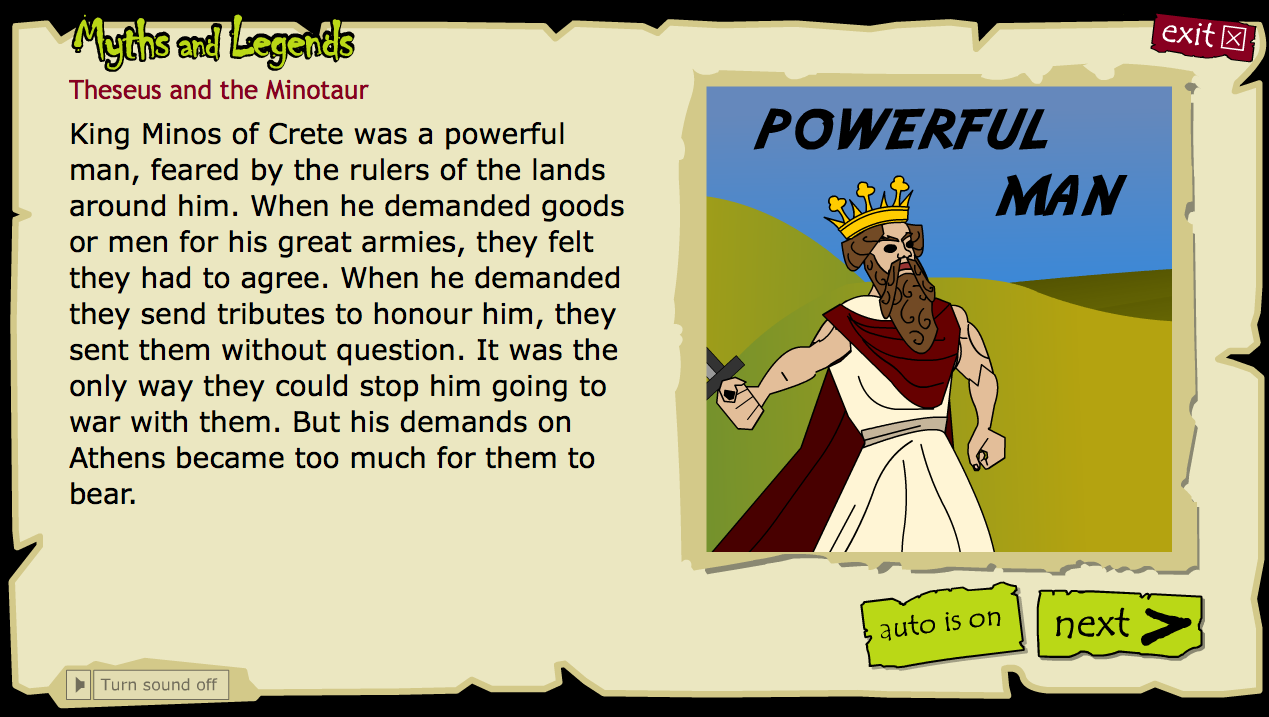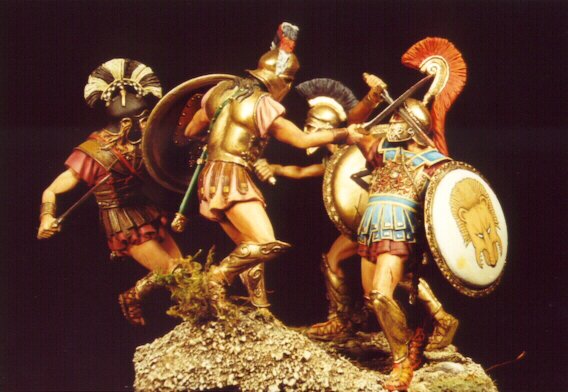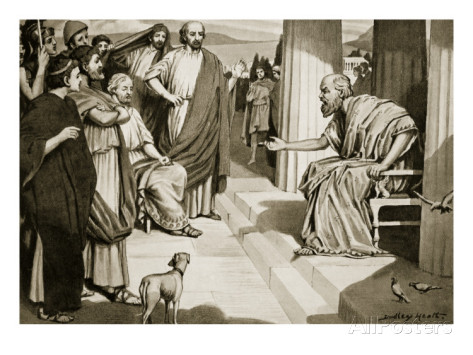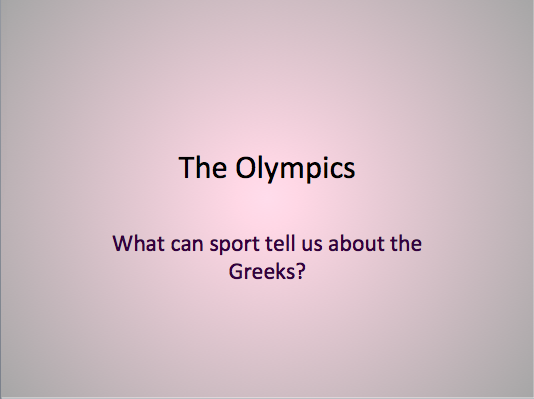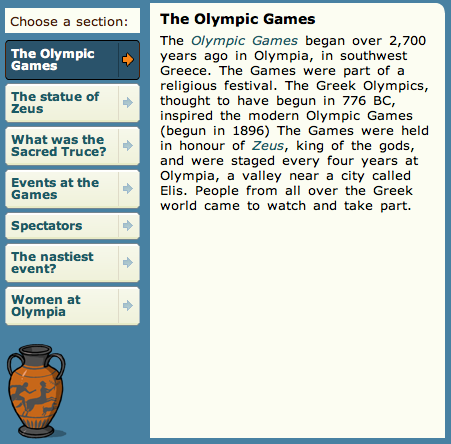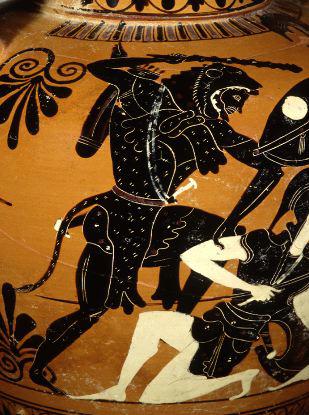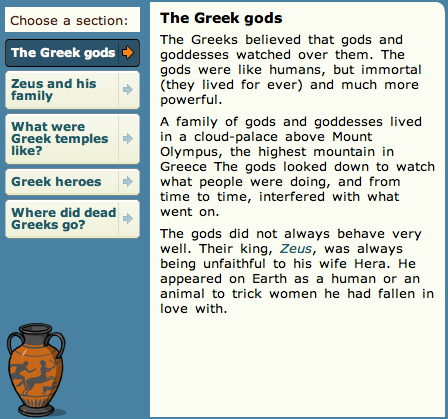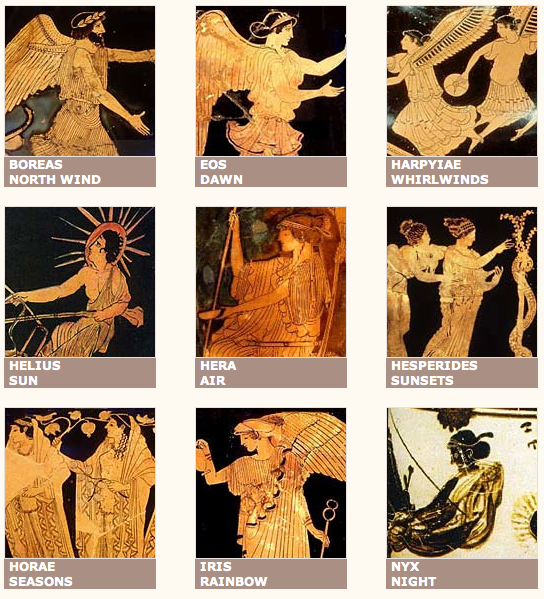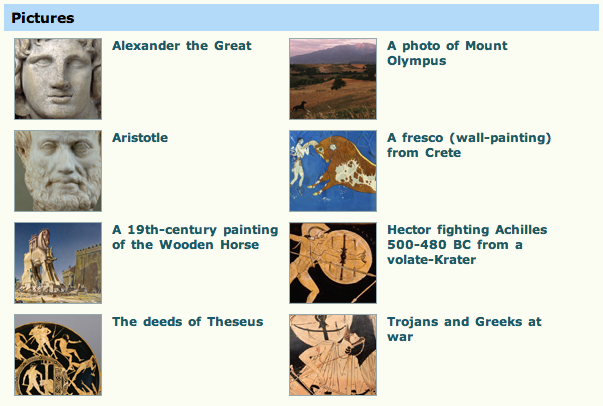Ancient Greece
Interactive Map
This is an interactive resource that highlights the different regions and notable places within Ancient Greece.
Your children can select a icon on the map and learn more about that particular place.
This is a super resource that allows your children to learn key terms and information about the Ancient Greek civilisation.
Timeline
This resource highlights the key events in the Ancient Greek civilisation.
It gives key date to the Persian and Peloponnesian Wars, Inventions, Kings and Leaders and the Romans.
Myths and Legends
Check out our Myths and Legends page linked to Ancient Greece. These resource include stories, animations and video clips for your children to grasp some key myths and characters.
Peloponnesian War
Q: How do Ancient Greeks want to be remembered?
Peloponnesian War
In Ancient Greece, Athens and Sparta were the most powerful and influential Greek city-states. At this time, the leader of the Athenians was Pericles. As Xerxes and his Persian army retreated, Athens grew more powerful and tensions rose, escalating into nearly three decades of war. Sparta emerged victorious, while the constant fighting left Athens bankrupt, exhausted and demoralized. Neither city-state regained the military strength they once had.
A: Ancient Greeks want to be remembered as brave warriors and heroes. Most notably, the Spartans.
Ancient Greek Stories
This is a collection of ancient greek stories. The stories are read to your children which is a great listening exercise. The resource explores stories of
- 1: Persephone and Hades
- 2: Orpheus and Eurydice
- 3: Theseus and the Minotaur
- 4: King Midas and the golden touch
- 5: Perseus and the Gorgon Medusa
- 6: Odysseus and the Trojan Horse
- 7: Odysseus and the Cyclops
- 8: Odysseus and Penelope
Peloponnesian War - Video Clip
This video clip is a fantastic overview of the Peloponnesian War. The story is read/sang by a musician and artist which makes an interesting watch.
Spartans and Athenians
The Spartan and Athenian civilisations were both very different in their cultures. Spartans were fundamentally professional soldiers, which differs immensely from Athenians, who boast the birthplace of the educational classroom. The list of key figures each left behind as a legacy: Spartans are remembered for Leonidas and the 300, Athenians boast key figures of a varying nature, from Socrates (philosopher and teacher) to Alexander the Great (created one of the largest empire in ancient history).
Athens was the most developed city in Greece, having introduced laws, formal education, sport, democracy and politics. However it has to be noted that in contrast to Spartans, these areas mattered most to Athenians.
Spartans were illiterate (for the most part), they were educated in the art of war, and seeing as how slaves outnumbered the Spartans 10:1 this is hardly surprising. Due to “in-house” wars constantly unfolding in Sparta, the idea of expansion to new lands was not a dream of Spartans.
It could be argued that Athens was a city before its time in many respects due to its multi-dimensional cultural and political achievements. Other than the marginally increased prestige of women in comparison to other Greek cities, Sparta arguably is famous on a more one dimensional level, Fighting.
In any case, both cities achieved in abundance, and although very different, both landmark their place in history.
Athens and Athenians
Athens was the largest city in Greece, and controlled a region called Attica. Between the many mountains were fertile valleys, with many farms. Athens became rich because Attica also had valuable sources of silver, lead and marble. Athens also had the biggest navy in Greece.
Athens was a beautiful and busy city. People came to the city from all over Greece, and from other countries, to study and to trade. The city’s most famous building was the temple called the Parthenon. It stood on a rocky hill called the Acropolis. Inside the Parthenon stood a statue of the city’s protector-goddess Athena.
To learn more about Athens click here
This PowerPoint explores the nature of the Athenians (the people who lived in Athens). It mentions a few key Athenians, how the city was named, myths, key buildings which gives an insight to the city and culture at that time.
The Olympics
Another great interactive resource that highlights the different events of the Ancient Olympics.
Each event has a short description and the children can also take part in fun activities and a quiz once they have finished.
The Ancient Olympics
Q: How do Ancient Greeks want to be remembered?
This PowerPoint explores the origins of the games, Zeus, competitors, judges and more.
The first Olympics had only the footrace. Over time longer races and new events were added. The games were held at Olympia, in the Peloponnesus, on the site of a major temple. The aim of the games was to honour Zeus.
Quick Facts:
- Greeks came from all over the Mediterranean to compete in the games.
- A truce was declared a month before the games to allow people to travel. This meant wars and battles were postponed.
A: They want to be remembered as being athletic, powerful, strong and most importantly, as winners.
Olympic Games
The Olympic Games originated over 2,700 years ago in Olympia, a location in southwest Greece. The Games were part of a religious festival and people from all over the Greek world came to watch and take part. The Greek Olympics, thought to have begun in 776 BC, inspired the modern Olympic Games, which was introduced by Pierre de Coubertin in 1896. The Games were held in honour of Zeus, king of the gods, and were staged every four years at Olympia, a valley near a city called Elis.
Milo of Kroton
One of the most legendary athletes in the ancient world, Milo of Kroton, wore the victor’s crown at Olympia no less than six times. Born in southern Italy, where Greece had many colonies, Milo won the boys’ wrestling contest in 540 BCE.
He returned eight years later to win the first of five consecutive wrestling titles, a feat that seems incredible by modern standards. Rarely do modern-day Olympians compete in more than two or three Olympiads over the course of a career. Much like the boxer George Foreman, Milo resisted retirement: By the time of the 67th Olympiad in 512 BCE, Milo was probably forty or more years old but he competed anyhow. The challenger won not by overpowering Milo, but by avoiding the older wrestler and wearing him out.
According to our ancient sources, Milo enjoyed showing off his unrivaled strength. For instance, he would clasp a pomegranate in his hand and have others try to take it away from him. Even though he was holding it so tightly that no one could remove it, he never damaged the fruit. Sometimes, he would stand on a greased iron disk and challenge others to push him off of it. Another of his favorite exhibitions was tying a cord around his forehead, holding his breath, and breaking the cord with his bulging forehead veins. Other times, the wrestler would stand with his right arm at his side, his elbow against him, and hold out his hand with thumb pointed upwards and fingers spread. No one could successfully bend even his little finger.
Greeks and Gods
The Ancient Greeks believed that gods and goddesses watched over them. There were many popular gods and goddesses during this time. The gods were believed to be immortal and powerful beyond measure. So powerful that they could control the weather.
Just like the Christian God’s heaven, a family of gods and goddesses lived in a cloud-palace above Mount Olympus. Mountain Olympus was the highest mountain in Greece. The gods looked down to watch what people were doing, and from time to time, interfered with what went on.
A list of Gods:
Zeus was king of the gods. He threw thunderbolts to punish anyone who disobeyed him. His brother Poseidon was god of the sea. Another brother, Pluto (also called Hades), ruled the underworld.
Apollo (Zeus’s son) was the sun god, and the god of the arts, medicine, music and poetry.
Artemis (Apollo’s twin sister) was goddess of the moon, and goddess of childbirth, and of all natural things. She is often shown as a hunter with a bow and arrow.
Athena was goddess of wisdom, and of crafts such as spinning, weaving and pottery.
Ares was the bad-tempered god of war.
Alexander the Great
Alexander, known as the Great Greek, was not Greek. He was a Macedonian prince. Macedonia was an empire located to the north of Greece.
Alexander had many teachers, one of which was Aristotle. Aristotle was also born in Macedonia. However, Aristotle lived in Greece for a really long time. He loved the Greeks. He believed in the Greek gods. He knew Greek history and the Greek language and Greek theatre. Aristotle thought the Greeks were clever and interesting and talented, and he spoke of his admiration for the Greeks many times to his student, the young prince, Alexander.
To learn more click the image.



